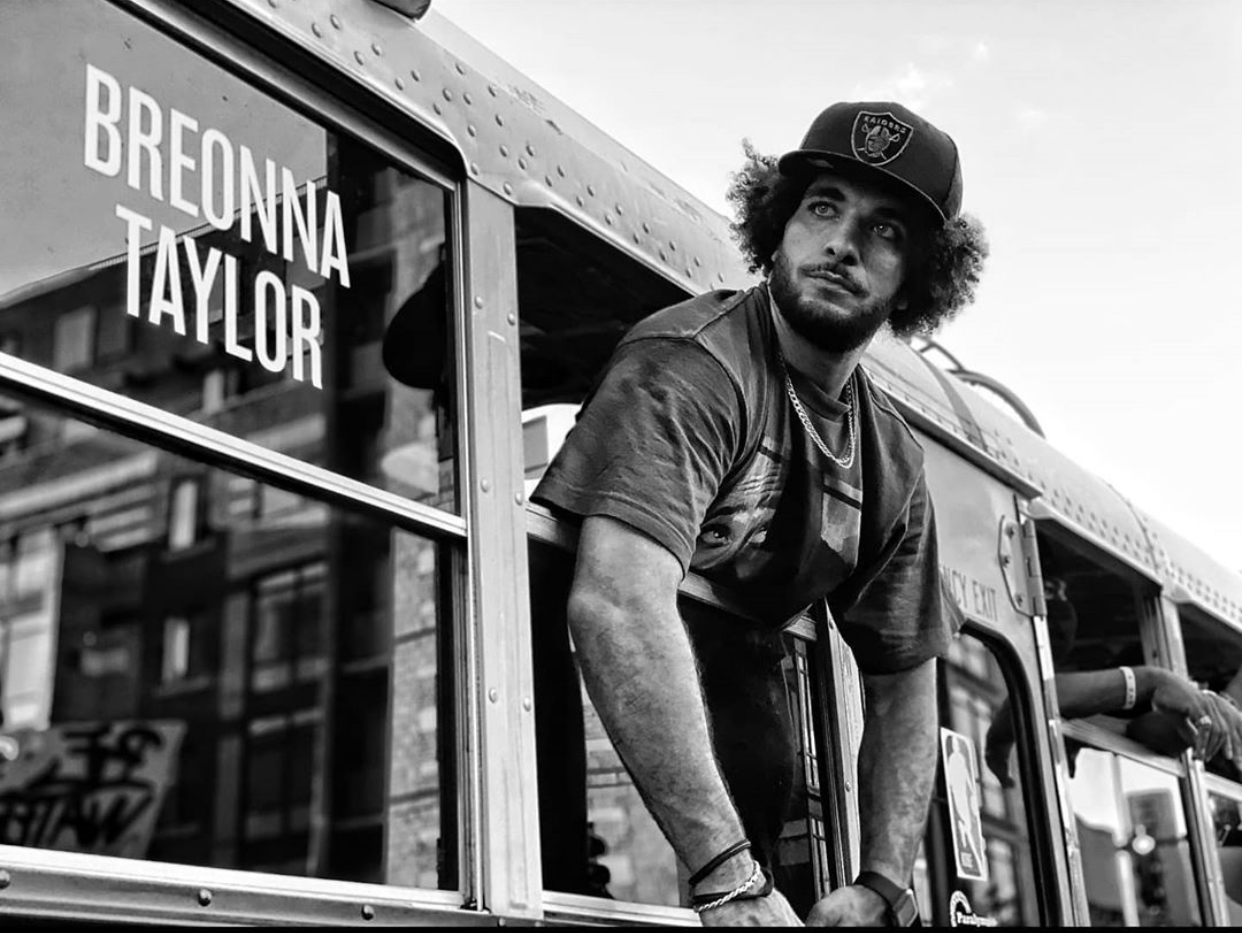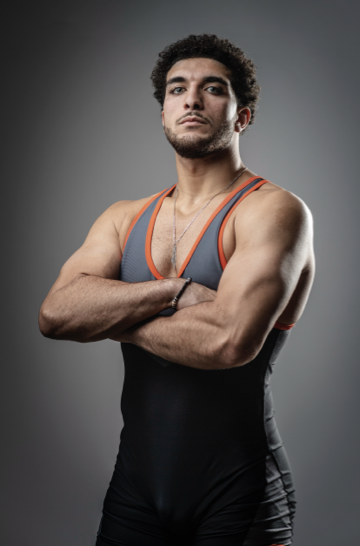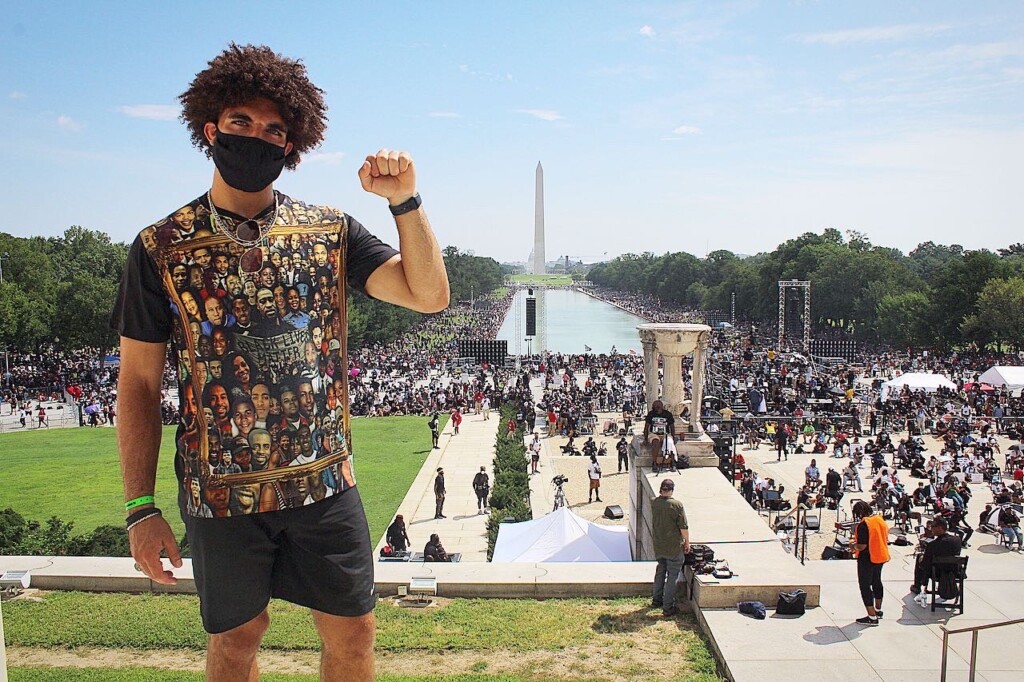News, articles, and interesting stuff from the College of Business
Empowerment & Education: Adam Rateb
A long list of accomplishments for Adam Rateb '20, MBA '21 includes athletic and academic accolades and community leadership.


Powerful leader and activist wants change, one heart, one home at a time
Like many a star athlete, Adam Rateb started his undergraduate studies in kinesiology as his life at the time centered around sports. It was what he knew.
The Division I OSU wrestler is much, much more than that, he learned, including an outstanding student.
A common practice among collegiate athletes is to utilize a “redshirt” season and complete an undergraduate degree in five years. A lighter course load allows the athlete to balance the demands of sports and academics. Some professional sports even draw students into their ranks prior to degree completion. But that path was not in line with Rateb’s ambitions.
“I came to an early conclusion that sports are not going to be my livelihood forever,” Rateb said. “I realized I could take advantage of my years as a student-athlete then I can walk away from Oregon State with multiple degrees.”
Rateb leveraged his undergraduate business administration minor to enter the fast-track MBA program at the College of Business, which was designed specifically for highly motivated, high-achieving students like Rateb to earn their MBA in nine months. So he graduates in June 2021 with his MBA in marketing.
Rateb likes to calculate his undergrad GPA without any first-year classes in the mix. (It’s a 3.86 sans freshman year.) Because after changing his undergraduate major in the second year to public health, he never earned less than a B, and that includes his graduate MBA studies.
“My graduate degree has only taken me one year to complete as I participated in an accelerated version of the program, which is not recommended for every student – let alone a student-athlete,” Rateb said. “I’ve had to stack my course load, wrestling training, work, my organizations, my fraternity, meetings and community involvement this entire school year. But trust me … I am not complaining. I love everything about what I do.”
In addition to all that athletics and academics is a long list of involvement and leadership with groups such as the Alpha Phi Alpha fraternity, membership in the Muslim Student Association, a board member of the Distinguished Scholars Initiative, and president of the National Association for the Advancement of Colored People.
Along the way, he’s earned honors, including the Golden State Scholarship Award, the LBH Black Excellence Award, the Jason Dorsette NAACP Award; he made the honor roll for eight terms as an undergraduate. He earned his Certificate in Professional Sales from the OSU Sales Academy.
But what is truly emerging is a powerful voice for social change.
I pray that this is the generation that can tear down the social injustice that has been rooted in different segments of the United States, but I feel like that starts in the home. If I can touch the heart of just one person, or change the perspective of just one group, they are going to take that to their home and teach their kids how to love their peers.
Adam Rateb
Rateb was a leadership presence at Black Lives Matter protests in the aftermath of George Floyd’s murder in 2020, and immersed himself in the empowerment of social action and the pressing need for social justice in our country. There is real anger and sadness about this long crisis, he says, among Black people. That goes far beyond what the mainstream is beginning to understand.
“I want everyone reading this to understand one thing,” Rateb said. “That disgusting man (former police officer Derek Chauvin) being charged with murder is not justice. Justice would be George Floyd, Ahmaud Arbery, Breonna Taylor, Daunte Wright, Daniel Prude, Aura Rosser, Stephon Clark, Botham Jean, Philando Castille, Alton Sterling, Freddie Gray, Eric Garner, Akai Gurley, Tamir Rice, Michael Brown, and the so many more unarmed black people brutally killed by police being alive today. Justice would be reform in the areas of society that so direly need it. Chauvin being tried for his hideous acts is simply him being held accountable for his actions.”
He points out that while he wholly supports campaigns such as “Stop Asian Hate,” no one has countered with “Stop All Hate.” Yet, that is how the country reacted to the Black Lives Matter campaign – by insisting that all lives matter.

“Nobody is denying that the Asian hate should be stopped,” he said. “But, why are there so many people that can’t live with the phrase, ‘Black Lives Matter’? Why is there a movement that goes against Black people wanting to be treated fairly? It is so blatantly racist that it is hard for me to put it into words. I wish I could tell the world my feelings, but this will have to do.”
Not surprisingly, Rateb isolates hate, or “too much hate” as the root of our social injustice, with ignorance as the biggest contributor to the hate. “If you see a woman wearing a hijab, or with a particular hair style, or with skin that is darker than your own, it is so much easier to push them away than to try to understand them. That is our problem. When people are uneducated on the practices of a group, they immediately see it as a threat. So we have to educate one another, learn to understand one another, and ultimately learn to LOVE one another. How can you be racist to someone you love?”
Rateb credits his work as a student-peer facilitator for the Lonnie B. Harris Black Cultural Center as a resource for personal growth as he pursued his degrees.
He met his current mentors (OSU’s Jason Dorsette, Terrance Harris, Johnny Peters and Dorian Smith) during second year, and they opened his eyes to the lack of mentors, scholarships, textbooks and funding in school districts all over the country. And, in fact, it is something Rateb experienced firsthand.
Rateb was born in Oakland, California, and the Oakland school district during his time there had only a 75% high-school graduation rate, credited primarily to the lack of resources. This has evolved to form his career passion for social work and business.
Rateb’s ultimate goal is to one day open a community center back in his hometown of Oakland and offer scholarships, textbooks and mentoring to underprivileged students in the city.
“There will never be a time in my life where I am not involved in the empowerment of underrepresented communities – it’s the career path that I plan to take once I have stabilized myself with savings,” Rateb said.
“One day I will open a community center in the Oakland Unified School District, so I can offer underprivileged students the opportunity to pursue higher education – primarily through tutoring, mentorship, textbooks and scholarships.
“I pray that this is the generation that can tear down the social injustice that has been rooted in different segments of the United States, but I feel like that starts in the home. If I can touch the heart of just one person, or change the perspective of just one group, they are going to take that to their home and teach their kids how to love their peers.
“They are going to carry these perspectives into conversations with their friends. They are going to help break the stereotypes and prejudice that everyone can so clearly recognize around us. There is no way for any single person to change the perspectives of everyone, but if we come together as a collective then we can build a generation of love for our kids, and their kids, and their kids!”